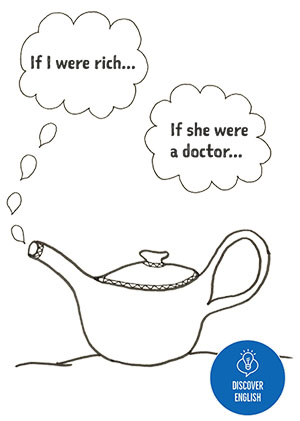 Recently, I was asked by one of my students why were is used instead of was with the pronouns I, he, she and it in the if clause of type 2 conditional (second / unreal conditional) sentences, as she found that somewhat confusing.
Recently, I was asked by one of my students why were is used instead of was with the pronouns I, he, she and it in the if clause of type 2 conditional (second / unreal conditional) sentences, as she found that somewhat confusing.
I thought this was the perfect opportunity to write another blog post, especially as it's been a while since I last wrote an article about a particular grammar topic.
First, let's look at the structure of a type 2 conditional sentence and what it is used for.
The second conditional describes imaginary or hypothetical situations, dreams and wishes. Those situations might become real one day, but most likely they will never happen.
So for example:
| IF + condition | Result |
| If + past simple | would + infinitive |
| If I had a million Euros, | I would donate a lot of money to charities. |
The clauses are interchangeable:
| Result | IF + condition |
| Would + infinitive | If + past simple |
| I would donate a lot of money to charities, | if I had a million Euros. |
But what happens if the verb "to be" is used in the if clause? Why can't we just use "was" for the pronouns "I" and "he, she, it" as it would be the proper past simple form?
This is because we are talking about an unreal situation. With the phrase "If I were / if she were... etc." you are changing the "mood" of the verb from indicative to subjunctive (see quick grammar tip below).
Therefore, whenever you use the second conditional to talk (or write) about a hypothetical situation, use were instead of was in the if clause.
Examples:
If Sandra were nicer to her neighbours, she would be invited to their parties.
If I were an author, I would write a book.
If the weather were warmer, we would eat dinner outside.
| Quick grammar tip: |
Verbs in the English language have three main moods:
|
If you liked this article and found it helpful, please share it on social media 😃 Also, if you don't want to miss any future blog articles, subscribe to my monthly newsletter!
Sources and further reading:
Books:
Martin Parrott: Grammar for English Language Teachers | Michael Swan: Practical English Usage
Web:
Grammar Girl (accessed on: 13.4.2020) | Grammarly (accessed on: 13.4.2020) | English Club (accessed on 13.4.2020) | CliffsNotes (accessed on 13.4.2020) | English Grammar for Dummies (accessed on 13.4.2020)
 Instagram
Instagram